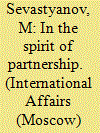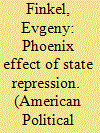| Srl | Item |
| 1 |
ID:
153973


|
|
|
|
|
| Summary/Abstract |
This article addresses the ways in which the systemic transformation of the former Soviet republics has been reflected in urban development in two capital cities, Minsk (Belarus) and Astana (Kazakhstan). Changes taking place in these capitals have been analysed through the prism of an ideological recycling of the socialist legacy, a concept that permits exploration of which aspects of the socialist legacy have been jettisoned and which retained, in the process of formation of a capital. The article explores the nationalising strategies adopted by Belarus and Kazakhstan and reified by various practices, including those involving the recasting of cities. These strategies, however, are analysed not as inventions of post-Soviet regimes, but as forms of structural continuity.
|
|
|
|
|
|
|
|
|
|
|
|
|
|
|
|
| 2 |
ID:
125123


|
|
|
|
|
| Publication |
2013.
|
| Summary/Abstract |
ON JUNE 5, 2013, Belarusian capital Minsk hosted the 64th regular meeting of the Council of the Commonwealth of Independent States defense ministers chaired by Russian Defense Minister Sergey Shoigu.
The meeting was attended by delegates of the defense ministries of Azerbaijan, Armenia, Belarus, Kazakhstan, Kyrgyzstan, Moldova, Russia, Tajikistan, Uzbekistan, and Ukraine, as well as by delegates of the CIS Executive Committee, the Secretariat of the CIS Council of Defense Ministers and the Committee of the CIS Heads of State Council for the Affairs of Warriors-Internationalists..
|
|
|
|
|
|
|
|
|
|
|
|
|
|
|
|
| 3 |
ID:
140176


|
|
|
|
|
| Summary/Abstract |
Why are some nascent groups able to organize sustained violent resistance to state repression, whereas others quickly fail? This article links the sustainability of armed resistance to a largely understudied variable—the skills to mount such a resistance. It also argues that the nature of repression experienced by a community creates and shapes these crucial skills. More specifically, the article focuses on a distinction between selective and indiscriminate state repression. Selective repression is more likely to create skilled resisters; indiscriminate repression substantially less so. Thus, large-scale repression that begins at time t has a higher chance of being met with sustained organized resistance at t +1 if among the targeted population there are people who were subject to selective repression at t‒1. The article tests this argument by comparing the trajectories of anti-Nazi Jewish resistance groups in three ghettos during the Holocaust: Minsk, Kraków, and Białystok.
|
|
|
|
|
|
|
|
|
|
|
|
|
|
|
|